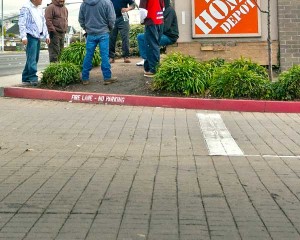
Boulevard Home Depot location in Hayward for as
much as 12 hours a day.
They censor themselves and are quick to cover their faces, afraid to reveal any personal information which could send them back to their native countries–a place they say is rampant with suffering and despair.
They are confused when people ask about their lives and who they are.
“What good does it do to talk if it won’t change anything,” asked a man who wished to remain anonymous.
All they do is wait, they say, as six hours turn easily into 12, patient through rain, heat and cold all in the hopes of striking it lucky.
On a freezing and somber Friday morning outside The Home Depot in Hayward, 15 men gathered with cookies and water bottles, telling themselves this time they will be lucky; this day will be the day.
The majority of them are from Mexico, with one or two from Central America, many who left their country of birth more than 10 years ago.
The hours pass by slowly for these men, who say although it has never been a lucrative profession, chances of work currently are slimmer than they have ever been.
“We have met good people in this country, and we have met people who have abused us and not paid us. We have been mistreated a lot,” said the anonymous laborer. “But sometimes I have met with good people in this country. I thank the good people who give us work, because of them I feel that I’m here honestly.”
Chasing an ever-diminishing “American Dream,” increasingly growing numbers of Hispanic men gather on corners and in front of home-improvement stores like The Home Depot across the nation.
With the economy, jobs have dwindled, but the unemployed have increased.
Although the issue of unemployment has affected all racial demographics, research shows Hispanics have been hit the hardest.
According to the U.S. Bureau of Labor Statistics, in 2009 the unemployment rate for foreign-born Hispanics was 70.8 percent.
By 2010, Hispanics made up 16.3 percent of the 308,745,538 United States population.
2010 U.S. Census data cites roughly 40.7 percent of the 144,186 total population in Hayward are Hispanics. Since 2000, there has been a 22.7 percent increase.
Analysts say the profession of a “day laborer” is becoming more commonplace in major urban cities nationwide.
Julio Loyola, Board President for La Raza Centro Legal in San Francisco, a community-based legal organization “dedicated to empowering Latino, immigrant and low-income communities,” says programs like their Day Labor Program, which aims to increase economic and employment opportunities for Hispanics help erase the stigma behind immigrants.
“The workers suffer the most,” said Loyola. “We come here because of economic abuse in our own countries and we try to find a place where we can survive. We are not stealing from anyone. In general, [Latinos] are the ones who do the jobs that no one else wants to do, like farm work. We need to think about who truly steals from us. It’s a vicious cycle in which the day laborers and Latinos get blamed for the economic condition, but people are ignorant on the issues.
63-year-old Francisco Perez, a native of Nicaragua who has been in the United States for more than 30 years, says that although he is a citizen, opportunities for employment are not as it used to be, and as a result wakes up every morning at dawn to try his chances along with everyone else.
“It’s not possible, it’s not possible to live like before,” said Perez. “But that’s how it is, and you learn to change to survive.”
There are signs of pain in their eyes, bloodshot and weak. Their hands cracked and worn, their clothing soiled and tattered.
But at the mention of their families, the light, which often escapes in times of suffering and despair, quickly returns as they say their earnings go towards helping their families back home.
Humberto Dector, 28, left Mexico nine years ago to alleviate his parent’s recent job loss as farm-workers in their rural town.
“I came, well, to look for the future,” said Dector, looking down at his hands, carefully observing his lines. “But the future is finished.”
He says his dream is to become a resident soon, and eventually a citizen.
Dector, like many day laborers, say it is commonplace to work for 10 or 12 hour days and then be declined pay. Some say they generally don’t earn more than six dollars an hour.
“I came to this country 20 years ago. I paid over $3,000 to get here, have risked my life crossing the border and left two daughters and a wife. Call me illegal, I say I am a human being desperate for a dream,” said Raul, who refused to give his last name. “It is worse in Mexico. It’s not easy here, and some days I don’t eat. But, well, it’s better than not eating at all.”
Raul says earnings average about $600 a week, sends about $200 a month home and shares an apartment in Oakland with three other day laborers.
The Hayward location is particularly interesting, as all but one man lived in Oakland, as they say there is too much competition at The Home Depot’s in Oakland and the Hayward location has generally been more accepting.
Stephen Holmes, spokesman for The Home Depot told The Pioneer it is not a company-wide issue, rather one that affects a small percentage of their stores, adding the company does maintain a policy of non-solicitation at its stores.
Holmes continues to say, “This is a complex community issue that requires the involvement of many affected groups including cities, law enforcement, local businesses, residents and other community stakeholders.”
Loyola says the complexity of the issue is not in solicitation, rather in how a changing face in the United States is slowly creeping into absolute poverty.
One man says they experience verbal harassment from drivers on Hesperian Boulevard daily, calling them “lazy” and “dirty illegals,” but says it doesn’t affect him as much as it used to, if it did he wouldn’t be the “strong and determined man that I am, like my people.”
“We are limited. We cannot go out to work legally. If we could go get a job legally, doesn’t matter if we were wiping tables, sweeping the streets, whatever, but we cannot do it without papers.”
All of the men say they will continue to look for work, regardless of how people see them or how unsuccessful they might be.
“It doesn’t feel good, but we stand here not because we want to just stand there, it’s because we came to find work,” explained Dector. He begins to laugh, “People don’t understand life is harder for us, but we believe in the country of dreams. I don’t really know why is so hard, but it is, so I try my best. My family needs me.”
One man in particular, who at the onset avoided any questions, stood up from his sitting spot, took off his cap and took out a picture from his wallet.
“This is my daughter when she was five. It was the last time I saw her,” he said. “Now she is 15. She writes me every week and tells me she misses me. I cry each time. Don’t people know we have emotions just like anyone else? We’re not lazy people, we are just like everyone else. Why can’t they understand that?”











